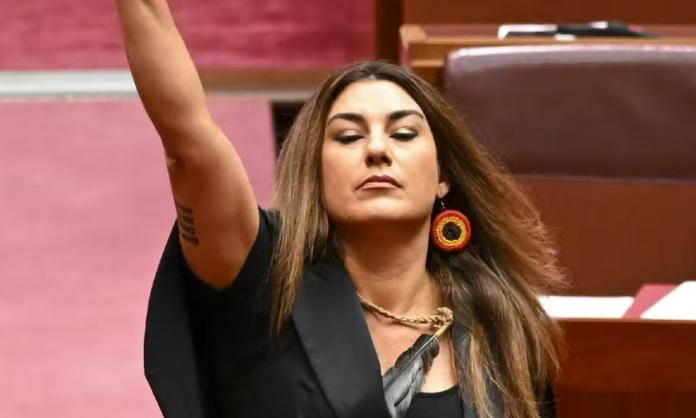Lidia Thorpe’s resignation as deputy leader of the Greens in the federal senate is the culmination of an organised and vicious campaign against her by an unholy alliance of the liberal media, the Labor Party, conservatives and many moderate Indigenous figures.
It began three weeks ago, when the Age and the Sydney Morning Herald published allegations, from another former Thorpe staffer, that he was scared and appalled by an “outburst” by Thorpe at a meeting with Marcus Stewart and Aunty Geraldine Atkinson, the co-chairs of the First Peoples’ Assembly of Victoria.
The pearl-clutchers at the former Fairfax mastheads waxed endlessly about how the senator had reportedly spoken over Atkinson in a “highly aggressive tone”. Thorpe responded that she had merely engaged in a “robust discussion”.
Either way, such a political interaction is hardly worthy of a serious media story. But through the lens of the Age and the Herald’s storytellers, the meeting was transformed into a vicious and traumatising attack by the malicious Thorpe on, as they never tired of pointing out, a grandmother in her 70s.
A week later, the Herald and the Age published a series of “news” articles claiming that Thorpe had attempted to form an alliance with the far right. The first piece of “evidence” for this was a report that Thorpe had attended a meeting with the former Liberal candidate and Indigenous man Warren Mundine to collaborate on a campaign against the proposed Indigenous Voice to Parliament.
Within 24 hours, it was revealed that the meeting was not about the Voice and that Indigenous politicians from many political parties had attended the meeting. A few days later, this was followed by a report about a five-year-old tweet in which Thorpe had asked One Nation leader Pauline Hanson, as well as other politicians, to oppose the now thoroughly discredited Recognise campaign led by Tony Abbott.
The fact that Hanson and Thorpe have spent the last year battling each other in the senate didn’t stop Joe Hildebrand from pontificating on news.com.au that this was proof that all “extremists are the same”.
It’s not surprising that right wingers like Hildebrand dislike Thorpe. But the more important factor in this campaign has been the role of a broad alliance of moderate Indigenous figures, Labor Party hacks, conservative Greens staffers and respectable journalists who have conspired to take down Thorpe.
The key reason for this is that she is one of the most prominent left-wing critics of the proposed Voice to Parliament, which is strongly backed by all of these political forces and the Australian establishment more generally.
Thorpe’s precise position on the Voice has shifted back and forth over the last twelve months, largely in response to the considerable amount of vitriol directed towards her for questioning it at all. But she is clearly, and correctly, sceptical about the value of it as a tool for advancing the interests of Indigenous people. As I’ve argued in Red Flag, the Voice will do little for Indigenous justice and is primarily window dressing, behind which the Albanese government can pretend to be doing something progressive.
Many moderate Indigenous leaders have jumped on the bandwagon, attacking Thorpe and even calling for her to resign from the senate altogether. This includes Marcus Stewart and Aunty Geraldine Atkinson. Both are also members of the Labor government’s Indigenous advisory panel. And Stewart is the partner of Labor Senator Jana Stewart.
Marcia Langton, who played a key role in designing the Voice, told the Australian that Thorpe “lacks in good judgement and common sense” and that she “is not fit for the task of representing properly and adequately our very complex issues”. Federal Deputy Opposition leader Sussan Ley and prominent right-wing critic of the Voice Jacinta Price have called on Thorpe to resign from parliament and intend to move a censure motion against her. (So much for the idea that Thorpe is in an alliance with the political right.)
When placed in this broader context, the hue and cry around the recent revelation of Thorpe’s association with former Rebels bikie Dean Martin appears extremely hypocritical. Most politicians get away with having close ties to exploitative CEO’s, high ranking cops, military generals and spooks—who are far more “criminal” in any meaningful sense of the word than some former bikie leader.
This whole campaign also reveals something about the nature of the Greens. If they can’t stand up to a confected moral panic about one of their own, then what hope can there be that they will stand their ground in the face of a serious campaign by the ruling class?
How on earth are they going to push for any serious changes to Australian society if they are unwilling to even stand up for their own senator? For many progressive people, the Greens might seem radically different to the major parties. But party leader Adam Bandt’s dressing down of Thorpe and his pre-emptive move to talk to the Australian Federal Police about her as some sort of threat to security shows that, underneath the rhetoric, the Greens establishment is playing the same game and bowing down to the same people as the other politicians.









